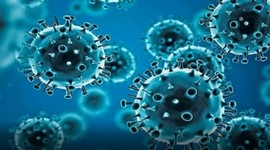Airborne fungal spores may help predict Covid, flu surge: Study
By IANS | Updated: June 20, 2025 17:58 IST2025-06-20T17:52:01+5:302025-06-20T17:58:41+5:30
New Delhi, June 20 Monitoring fungal spores in the outdoor air can predict surges in flu and Covid-19 ...

Airborne fungal spores may help predict Covid, flu surge: Study
New Delhi, June 20 Monitoring fungal spores in the outdoor air can predict surges in flu and Covid-19 infections, according to a study.
Researchers from Lynn University in Florida, US, discovered that airborne concentrations of fungal spores -- but not pollen -- were strongly linked to increases in flu and Covid-19 cases.
When airborne concentrations of fungal spores rose, the scientists often saw a jump in infections within a few days.
The study models were able to predict flu and Covid-19 surges with high accuracy, particularly in the fall season. However, pollen didn’t show the same connection or prediction.
“The findings from our study suggest that monitoring airborne fungal spore levels could help predict short-term outbreaks (spikes) of flu and Covid-19, giving public health systems an early warning signal,” said Felix E. Rivera-Mariani, Associate Professor of Biochemistry at Lynn.
“Our findings also highlight the potential role of environmental factors -- not just person-to-person spread -- in contributing to the incidence of respiratory viral infections. That could open new doors for targeted public health alerts, especially in areas with high outdoor airborne fungi," Rivera-Mariani added.
In the study, the team examined daily data from 2022 to 2024, in two major health regions in Puerto Rico—San Juan and Caguas.
The data included the daily incidence of people diagnosed with Covid-19 and flu, and the concentrations of airborne fungal spores and pollen recorded on the same days.
The scientists then implemented statistical and machine learning models to see if high levels of these environmental exposures could predict spikes in flu and Covid-19 cases within the same week or the following week (called lag-effect).
“The findings may help inform environmental risk alerts, particularly for vulnerable populations like the elderly or those with asthma and allergic rhinitis,” Rivera-Mariani said.
The study was presented at ASM Microbe 2025 in Los Angeles, the annual meeting of the American Society for Microbiology.
Disclaimer: This post has been auto-published from an agency feed without any modifications to the text and has not been reviewed by an editor
Open in app